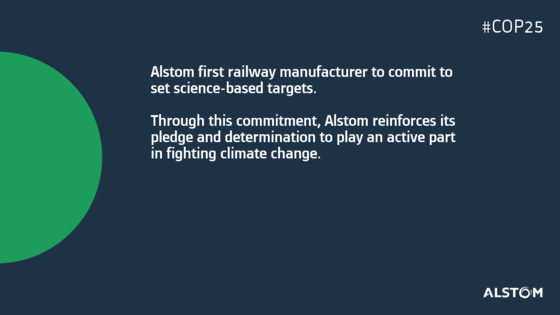
Alstom commits to set science-based targets
The COP25 is being held in Madrid, Spain, until 13 December. Four years after the Paris Agreement that saw governments of 195 countries make a pledge to limit global warming, it is evident that no country can achieve this goal without the corporate sector. That is why a growing number of companies are committing to the “Science Based Targets” initiative (SBTi), a framework for carbon emissions reduction. Alstom is the first railway manufacturer to commit to set such a target.
About Science Based Targets
“Science Based Targets” is an initiative launched by World Wide Fund for Nature (WWF), the World Resources Institute, CDP and the UN Global Compact, which aims to provide pathways for leading companies to set ambitious greenhouse gas (GHG) reduction targets. In this framework, each company can demonstrate, over a period of time, that its strategy and ambitions are consistent with the challenge of limiting global warming.

Leading the way to sustainable and smart mobility - naturally
Read moreAlstom's participation
Following this commitment, we will now refine our targets to limit CO2 emissions based on our strategy and develop a methodology, to demonstrate that we are in line with the Paris Agreement trajectory based on internationally recognised scenarios for transport. These targets will then be submitted to the SBTi for validation.
The SBTi input and recommendations will help make Alstom’s strategy even more compatible with a low-carbon economy, thanks to further guidance to define and reach energy efficiency targets, in line with the current climate science.

"Global warming can only be stopped through collective effort from all actors involved. Through its commitment to Science Based Targets, Alstom reinforces its pledge and determination to play an active part in fighting climate change."
-
100%of our electricity supply to come from renewables by 2025
-
-25%energy consumption of our solutions by 2025
-
100%of our newly-developed solutions eco-designed by 2025
